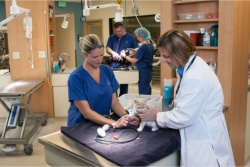Your pet loves you unconditionally, and now it’s time to return the favor by taking care of their heart! February is designated as American Heart Month. So, here at The COVE, we want to ensure that pet parents understand what a diagnosis of cardiac disease can mean for their pets.
What Causes Heart Disease in a Dog or Cat?
There are essentially two kinds of heart disease in dogs and cats: congenital and acquired. These diseases can affect the heart muscle, heart valves, electrical conduction of the heart, or blood vessels that carry blood from the heart to the rest of the body.
- Congenital heart conditions are diseases that are present at birth. Certain breeds are more prone to congenital heart disease, but any pet may be born with a heart defect. Some patients develop symptoms early in life and others can live for years before the defect causes a problem.
- Acquired heart conditions develop as a pet matures or ages. Most heart disease has a genetic basis – the tendency to develop cardiac disease comes from a pet’s bloodline. Other health conditions can affect the heart, including high blood pressure, an over or underactive thyroid, adrenal glands, toxins, infections, and, last but not least, heartworm disease.
What are the Signs and Symptoms of Heart Disease?
Heart disease can be present for months to years before symptoms occur. The symptoms that develop depend on which part of the heart is affected.
- Congestive heart failure (CHF) – if the heart is unable to efficiently pump blood forward to the vital organs, pressure will build up and fluid will begin to leak from the blood vessels into the lungs, around the lungs, or into the abdomen. Patients may experience shortness of breath, increased breathing rate, or a distended abdomen.
- Cough – many patients with heart disease will cough due to an enlarged heart pressing on the windpipe or due to CHF.
- Weakness or exercise intolerance – if the heart is unable to effectively and efficiently deliver blood to the lungs and muscles, your pet may not be able to accomplish its normal level of activity.
- Fainting or collapsing – cardiac patients may collapse due to reduced blood flow to the brain, either as the heart fails to effectively pump blood and oxygen to the brain or if an abnormal heart rhythm is present. Unfortunately, some patients can pass away suddenly.
- Sudden paralysis – blood clots can form within the heart and then dislodge and be propelled to other parts of the body, often between the rear legs. This is more common in cats.
- Abnormal behaviors – cats, in particular, are very good at hiding illness. Symptoms as subtle as hiding in strange places or not eating can be signs of heart disease.
Because many of the symptoms can be due to other health problems, it is essential that you call your primary care veterinarian, immediately if your pet experiences any of the above.

How is Heart Disease Diagnosed?
For an accurate diagnosis of cardiac disease, your primary care veterinarian should first examine your pet. Your doctor will complete a thorough physical exam, including auscultation with a stethoscope. Auscultation can detect abnormal heart sounds (heart murmur) or irregular heart beats (arrhythmia). Further tests may be performed in the veterinary office, including measurement of blood pressure, electrocardiogram, chest radiographs (X-rays), or bloodwork. Your doctor may recommend referral to a board-certified veterinary cardiologist. Board-certified specialists have completed advanced training in any one of several specialties. A cardiology specialist, like The COVE’s Dr. Small, will perform a more focused cardiovascular examination and advanced tests, such as echocardiography (ultrasound of the heart), invasive blood pressure monitoring, continuous electrocardiography, or other lab testing. A treatment and monitoring plan will then be established.
What is the Treatment for Cardiac Disease?
A few heart conditions can be treated with surgery but most cardiac conditions are not curable and are progressive. Cardiac disease can typically be managed for months to years with medication and careful monitoring. Not all heart conditions require treatment at the time of diagnosis. Often periodic rechecks are recommended until medication is necessary.
Early Detection and Prevention
Unfortunately, heart disease cannot always be prevented because of genetics. But, the earlier heart disease is detected, the more likely your pet can remain happy and comfortable for as long as possible. You can reduce your pet’s risk of developing symptoms of heart disease by scheduling routine exams with your primary care veterinarian and giving your pet heartworm preventative medication all year round. Regular exercise and a healthy diet can keep your furry loved one’s heart strong and healthy.
We hope you find this information helpful and insightful. Please remember that, if your pet needs advanced cardiology care, Dr. Small and her team are here to help.
About Us
The COVE’s veterinarians and staff wholeheartedly embrace the core values of community, collaboration, commitment, compassion, and integrity. This focus ensures that pets, the people who love them, and their primary care veterinarians have as positive and affirming a healthcare experience as possible, regardless of the circumstances that bring us all together.
